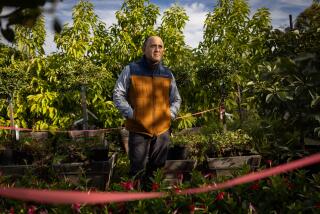ETA for Reaching Border From Mexico Set Back : ‘Killer Bees’ Find Going Slow on Way North
- Share via
The northward migration of Africanized honey bees has been slowed, and the temperamental insects might not cross the U.S.-Mexico border until 1991, federal and county officials said Monday.
Extremes in climate, a binational program and natural selection have played roles in slowing the bees’ progress, according to David Kellum, entomologist with the San Diego County Department of Agriculture, Weights & Measures. The bees had been expected to enter the Rio Grande Valley in Texas as early as next year.
“The timetables have all been pushed back,” Kellum said. “It’s a benefit in one sense, but it’s a handicap also because people might tend to forget about them. We don’t want people to get complacent.”
‘Killer’ Nickname
While the sting of an individual Africanized bee is no more venomous than that of the European bee common to the Americas, its nasty temperament has earned it the nickname “killer bee.” Although the European and Africanized bees look similar, the latter is considered by many to be a hybrid of the two. The Africanized bees, slightly smaller, are easily agitated, sting in larger swarms and will pursue a person longer and farther. The Africanized bees produce roughly the same amount of honey, but they consume more of it themselves, making them less desirable for beekeepers. Genetically, the traits of the Africanized bee are dominant when cross-breeding occurs.
Despite efforts to halt the bees altogether, they are still heading north. The bees are expected to enter California through Imperial County in three to five years, if the bees move west from Texas.
“A lot of climatic factors will come into play,” Kellum said. The Africanized strain might have trouble adapting to the extremes in climate found in the United States, Kellum said. The bees generally prefer tropical to subtropical climes.
The bees have also run into stiffer competition from the European variety during mating, Kellum said. The Africanized strain has not been as successful at overtaking wild European bee colonies in Mexico, slowing their northward advance.
Break for Researchers
James W. Glosser, administrator of the U.S. Department of Agriculture’s Animal and Plant Health Inspection Service, said a joint project with Mexico has delayed the bees’ arrival and “should give researchers and beekeepers enough time to study the bee and learn how to manage it.”
The program includes the detection and tracking of the bees as they near the U.S. border; trapping and destruction of swarms to reduce their numbers; and efforts to alter the bees genetically so they pose less of a threat.
There is debate among researchers on whether altering the bees genetically might instead “make a better Africanized bee”--one that can tolerate extremes in temperature as well as retain aggressive characteristics, Kellum said. Others feel that the bee has not been diluted by the European strain at all and is a pure strain of the African bee.
Kellum said he thinks the bees that do make it to the United States will be an intermediate variety. “I personally think that we’ll have a bee out there that will be somewhat more manageable” than the Africanized strain now headed north, he said.
More to Read
Sign up for Essential California
The most important California stories and recommendations in your inbox every morning.
You may occasionally receive promotional content from the Los Angeles Times.













